- Home
- Lynne Reid Banks
The Indian in the Cupboard (Essential Modern Classics, Book 1) Page 5
The Indian in the Cupboard (Essential Modern Classics, Book 1) Read online
Page 5
The morning lasted forever. Three times his teacher had cause to tell Omri to wake up. At last Patrick leant over and whispered, “You’re even dreamier than usual today. What’s up?”
“I’m thinking about your Indian.”
“Listen,” hissed Patrick. “I think you’re having me on about that Indian. It was nothing so marvellous. You can buy them for a few pence in Yapp’s.” (Yapp’s was their local newsagent and toyshop.)
“I know, and all the equipment for them! I’m going shopping at lunchbreak; are you coming?”
“We’re not allowed out of school at lunch unless we eat at home, you know that!”
“I’m going anyway. I’ve got to.”
“Go after school.”
“No, I’ve got to go home after school.”
“What? Aren’t you staying to skateboard?”
“Omri and Patrick! Will you kindly stop chattering?”
They stopped.
At long last lunchtime came.
“I’m going. Are you coming?”
“No. There’ll only be trouble.”
“I can’t help that.”
“You’re a twit.”
Twit or not, Omri sneaked out, ran across the playground, through a hole in the fence (the front gate was locked to keep the infants from going in the road) and in five minutes, by running all the way, had reached Yapp’s.
The selection of plastic figures there was good. There was one whole box of mixed cowboys and Indians. Omri searched till he found a Chief wearing a cloak and a full feather headdress, with a bow in his hand and a quiverful of arrows slung across his back. Omri bought it with part of his lunch money and rushed back to school before he could be missed.
He showed the Chief to Patrick.
“Why get another Indian?”
“Only for the bow and arrows.”
Patrick was now looking at him as if he’d gone completely screwy.
In the afternoon, mercifully, they had two periods of handicrafts.
Omri had completely forgotten to bring the tent he’d made, but there were plenty of scraps of felt, sticks, needles and thread lying about the handicrafts room and he’d soon made another one, much better than the first. Sewing had always bored him rigid, but now he sat for half an hour stitching away without even looking up. He was trying to achieve the patched look of a real tepee made of odd-shaped pieces of hide, and he also found a way of bracing the sticks so that they didn’t fold up every time they were nudged.
“Very good, Omri!” remarked his teacher several times. “What patience all of a sudden!” Omri, who usually liked praise as much as anyone, hardly heard her, he was concentrating so hard.
After a long time he became aware that Patrick was standing over him, breathing through his nose rather noisily to attract his attention.
“Is that for my Indian?”
“My Indian. Yes.”
“Why are you doing it in bits like that?”
“To be like a real one.”
“Real ones have designs on.”
“So will this. He’s going to paint proper Iroquois ones.”
“Who is?”
“Little Bull. That’s his name.”
“Why not call him Running Nose?” asked Patrick with a grin.
Omri looked up at him blankly. “Because his name’s Little Bull,” he said. Patrick stopped grinning. He frowned.
“I wish you’d stop this stupid business,” he said peevishly. “Going on as if it weren’t a joke.”
Omri went on looking at him for a moment and then went back to his bracing. Each pair of sticks had to have another, short stick glued between them with Airfix glue. It was quite tricky. Patrick stood a minute and then said, “Can I come home with you today?”
“No. I’m sorry.”
“Why not?”
“Mum’s having guests,” Omri mumbled. He didn’t tell lies very well, and Patrick knew at once it was a lie and was hurt.
“Oh, all right then, be like that,” he said, and stalked off furiously.
The afternoon ended at last. Omri accomplished the walk home, which with normal dawdling took half an hour, in a little over ten minutes. He arrived sorely out of breath and greeted his surprised mother (“Have you developed a jet-engine, or have you been expelled?”) with a lot of gasping and a request to eat tea in his room.
“What have you been up to, up there? There’s an awful mess on the floor – looks like bits of grass and bark. And where did you get that beautiful little Indian tepee? I think it’s made of real leather.”
Omri looked at her, speechless. “I—” he began at last. Telling lies to Patrick was one thing. Lying to his mother was quite something else and he never did it unless the emergency was dire. But mercifully the phone rang just then, so he was spared – for the moment. He dashed upstairs.
There was indeed a fair old mess, though no worse than he often left himself when he’d been working on something. Little Bull and the pony were nowhere to be seen, but Omri guessed where to look – behind the dressing-up crate.
A wonderful sight met his eyes. A longhouse – not quite finished, but no less interesting and beautiful for that – stood on the seed-box, whose smooth surface was now much trampled over. There were hoof- as well as moccasin-prints. Omri saw that a ramp, made of part of the bark, had been laid against the wooden side of the box, up which the pony had been led – to Omri’s delight (odd as it may seem) a tiny pile of horse-manure lay on the ramp as proof of the pony’s passing. And there he was, tied by a thread to an upright twig hammered (presumably) into the ground, munching a small pile of grass which the Indian had carried up for him.
Little Bull himself was still working, so intently that he did not even notice he was not alone. Omri watched him in utter fascination. The longhouse was about half finished. The twigs, which had been pliant ones taken from the weeping-willow on the lawn, had been stripped of their bark, leaving them shining white. Each one had then been bent into an arch, the ends thrust into the earth, and cross-pieces lashed to the sides with thread. More and more twigs (which were stout poles to the Indian) had been added, with never a nail or a screw needed, to strengthen the structure, and now Little Bull had begun to fix flakes of bark like tiny tiles, on to the cross-pieces.
He was seated on the roof itself, his feet locked round the main roof-pole which ran the length of the house hanging these bark-tiles, each of which he would first carefully shape with his knife. The knight’s battle-axe lay on the ground beside an unused pile of twigs. It had clearly been used to chop and strip them and had been made to serve Little Bull’s purpose very well.
At last Omri saw him straighten up, stretch his arm towards the ceiling, and open his mouth in a tremendous noisy yawn.
“Tired?” he asked him.
Little Bull got such a fright he almost fell off the longhouse roof, and the pony neighed and tugged at his rope. But then Little Bull looked up and saw Omri hanging over the crate far above him, and grinned.
“Little Bull tired. Work many hour. Look! Make longhouse. Work for many braves. I make alone. Also not good tools. Axe Omri give heavy. Why no tomahawk?”
Omri was getting used to his Indian’s ungrateful ways and was not offended. He showed him the tepee he’d made. “I suppose you won’t want this, now you’ve got your longhouse,” he said rather sadly.
“Want! Want!” He seemed to have decided tepees had their uses after all. He circled it. “Good! Give paints. Make pictures.”
Omri unearthed his poster paints. When he came back with them, he found Little Bull sitting cross-legged on the earth, facing the figure of the Chief which Omri had put next to the tepee. Little Bull was clearly puzzled.
“Totem?” he asked.
“No! It’s plastic.”
“Plass-tick?”
“Yes. I bought it in a shop.”
Little Bull stared at the figure with its big feather headdress.
“You make magic, get bow and arrows from plass-tic
k?”
“Yes.”
“Also make feathers real?” he asked, with a gleam in his eye.
“You like that headdress?”
“Little Bull like. But that for Chief. Little Bull not Chief till father die. Little Bull wear feathers of Chief now, spirits angry.”
“But you could just try it on?”
Little Bull looked doubtful but he nodded.
“Make real. Then see.”
Omri shut the Indian Chief into the cupboard. Before he turned the key, he leant down to where Little Bull was examining the (to him) enormous pots of paint.
“Little Bull, are you lonely?”
“Huh?”
“Would you like a – friend?”
“Got friend,” said the Indian, jerking his head towards the pony.
“I meant, another Indian.”
Little Bull looked up swiftly, his hands still. There was a long silence.
“Wife?” he asked at last.
“No, it’s a man,” said Omri. “The – Chief.”
“Not want,” said Little Bull immediately, and went back to his work with a bent head.
Omri was disappointed. He had thought it might be fun to have two Indians. But somehow he couldn’t do anything Little Bull didn’t want. He would have to treat this Chief as he had treated the knight – grab the weapons and turn him back into plastic again at once.
Only this time it wasn’t quite so easy.
When he opened the cupboard, the Chief was sitting on the shelf, looking about him in bewilderment, blinking as the light struck his eyes. Omri saw at once that he was a very old man, covered in wrinkles. He took the bow out of his hands quite easily. But the quiverful of arrows was hung round him on a leather thong, and as for actually lifting the feathered headdress off his grey old head, Omri found he just couldn’t bring himself to do it. It seemed so rude.
The old man gazed up at him, blankly at first, and then with dawning terror. But he didn’t get up and he didn’t speak, though Omri saw his lips moving and noticed he had hardly any teeth.
Omri somehow felt he should offer the old Chief some friendly word to reassure him. So he held up one hand, as white men sometimes did in films when they were treating Indian Chiefs with politeness, and said, “How.”
The old Indian lifted a trembling hand, and then suddenly he slumped on to his side.
“Little Bull! Little Bull! Quick, get on to my hand!”
Omri reached down and Little Bull climbed on to his hand from the longhouse roof.
“What?”
“The old Indian – I think he’s fainted!”
He carried Little Bull to the cupboard and Little Bull stepped off on to the shelf. He stooped beside the crumpled figure. Taking the single feather out of the back of his own headband he held it in front of the old man’s mouth. Then he shook his head.
“Dead,” he said. “No breath. Heart stop. Old man. Gone to ancestors, very happy.” Without more ado, he began to strip the body, taking the headdress, the arrows, and the big, richly-decorated cloak for good measure.
Omri was shocked.
“Little Bull, stop. Surely you shouldn’t—”
“Chief dead; I only other Indian here. No one else to be Chief. Little Bull Chief now,” he said, whirling the cloak about his own bare shoulders and clapping the splendid circle of feathers on to his head with a flourish. He picked up the quiver.
“Omri give bow!” he commanded. And it was a command. Omri obeyed it without thinking. “Now! You make magic. Deer for Little Bull hunt. Fire for cook. Good meat!” He folded his arms, scowling up at Omri.
Omri was quite taken aback by all this. While giving Little Bull every respect as a person, he was not about to be turned into his slave. He began to wonder if giving him those weapons, let alone letting him make himself into a Chief, was such a good idea.
“Now look here, Little Bull—” he began, in a teacherish tone.
“OMRI!”
It was his father’s voice, fairly roaring at him from the foot of the stairs. Omri jumped, bumping the cupboard. Little Bull fell over backwards, considerably spoiling his dignity.
“Yes?”
“COME DOWN HERE THIS INSTANT!”
Omri had no time for courtesies. He snatched Little Bull up, set him down near his half-finished longhouse, shut and locked the cupboard and ran downstairs.
His father was waiting for him.
“Omri, have you been in the greenhouse lately?”
“Er—”
“And did you, while you were there, remove a seed-tray planted out with marrow seeds, may I ask?”
“Well, I—”
“Yes or no.”
“Well, yes, but—”
“And is it possible that in addition you have been hacking at the trunk of the birch and torn off strips of bark?”
“But Dad, it was only—”
“Don’t you know trees can die if you strip too much of their bark off? It’s like their skin! As for the seed-tray, that is mine. You’ve no business taking things from the greenhouse and you know it. Now I want it back, and you’d better not have disturbed the seeds or heaven help you!”
Omri swallowed hard. He and his father stared at each other.
“I can’t give it back,” he said at last. “But I’ll buy you another tray and some more seeds. I’ve got enough money. Please.”
Omri’s father had a quick temper, especially about anything concerning the garden, but he was not unreasonable, and above all he was not the sort to pry into his children’s secrets. He realized at once that his seed-tray, as a seed-tray, was lost to him forever and that it was no use hectoring Omri about it.
“All right,” he said. “You can go to the hardware shop and buy them, but I want them today.”
Omri’s face fell.
“Today? But it’s nearly five o’clock now.”
“Precisely. Be off.”
Chapter Seven
UNINVITED BROTHERS
OMRI WAS NOT allowed to ride his bicycle in the road, but then he wasn’t supposed to ride it on the pavement either, not fast at any rate, so he compromised. He rode it slowly on the pavement as far as the corner, then bumped down off the curb and went like the wind.
The hardware shop was still open. He bought the seed-tray and the seeds and was just paying for them when he noticed something. On the seed packet, under the word ‘Marrow’ was written another word in brackets: ‘Squash’.
So one of the ‘Three Sisters’ was marrow! On impulse he asked the shopkeeper, “Do you know what maize is?”
“Maize, son? That’s sweetcorn, isn’t it?”
“Have you some seeds of that?”
Outside, standing by Omri’s bike, was Patrick.
“Hi.”
“Hi. I saw you going in. What did you get?”
Omri showed him.
“More presents for the Indian?” Patrick asked sarcastically.
“Well, sort of. If—”
“If what?”
“If I can keep him long enough. Till they grow.”
Patrick stared at him and Omri stared back.
“I’ve been to Yapp’s,” said Patrick. “I bought you something.”
“Yeah? What?” asked Omri, hopefully.
Slowy Patrick took his hand out of his pocket, held it in front of him and opened the fingers. In his palm lay a cowboy on a horse, with a pistol in one hand pointing upward, or what would have been upward if it hadn’t been lying on its side.
Omri looked at it silently. Then he shook his head.
“I’m sorry. I don’t want it.”
“Why not? Now you can play a proper game with the Indian.”
“They’d fight.”
“Isn’t that the whole idea?”
“They might hurt each other.”
There was a pause, and then Patrick leant forward and asked, very slowly and loudly, “How can they hurt each other? They are made of plastic!”
“Listen,” said Om
ri, and then stopped, and then started again. “The Indian isn’t plastic. He’s real.”
Patrick heaved a deep, deep sigh and put the cowboy back in his pocket. He’d been friends with Omri for years, ever since they’d started school. They knew each other very well. Just as Patrick knew when Omri was lying, he also knew when he wasn’t. The only trouble was that this was a non-lie he couldn’t believe.
“I want to see him,” he said.
Omri debated with himself. He somehow felt that if he didn’t share his secret with Patrick, their friendship would be over. He didn’t want that. And besides, the thrill of showing his Indian to someone else was something he could not do without for much longer.
“Okay. Come on.”
Going home they broke the law even more, riding on the road and with Patrick on the crossbar. They went round the back way by the alley in case anyone happened to be looking out of a window.
Omri said, “He wants a fire. I suppose we can’t make one indoors.”
“You could, on a tin plate, like for indoor fireworks,” said Patrick.
Omri looked at him.
“Let’s collect some twigs.”
Patrick picked up a twig about a foot long. Omri laughed.
“That’s no good! They’ve got to be tiny twigs. Like this.” And he picked some slivers off the privet hedge.
“Does he want the fire to cook on?” asked Patrick slowly.
“Yes.”
“Then that’s no use. A fire made of those would burn out in a couple of seconds.”
Omri hadn’t thought of that.
“What you need,” said Patrick, “is a little ball of tar. That burns for ages. And you could put the twigs on top to look like a real campfire.”
“That’s a brilliant idea!”
“I know where they’ve been tarring a road, too,” said Patrick.
“Come on, let’s go.”
“No.”
“Why not?”
“I don’t believe in him yet. I want to see.”
“All right. But first I have to give this stuff to my dad.”
There was a further delay when his father at first insisted on Omri filling the seed-tray with compost and planting the seeds in it then and there. But when Omri gave him the corn seed as a present he said, “Well! Thanks. Oh, all right, I can see you’re bursting to get away. You can do the planting tomorrow before school.”

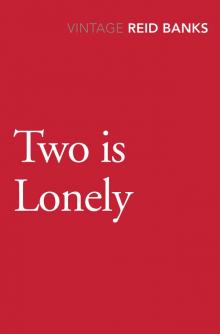 Two Is Lonely
Two Is Lonely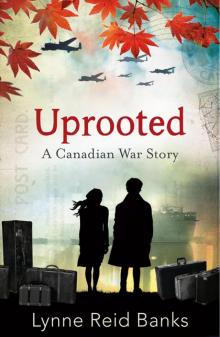 Uprooted - a Canadian War Story
Uprooted - a Canadian War Story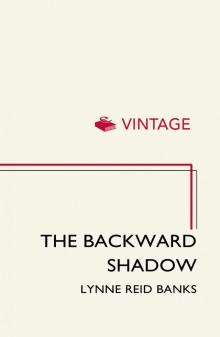 The Backward Shadow
The Backward Shadow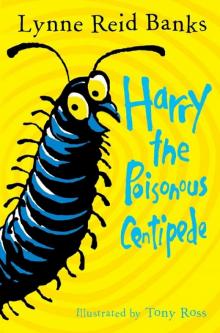 Harry the Poisonous Centipede: A Story to Make You Squirm
Harry the Poisonous Centipede: A Story to Make You Squirm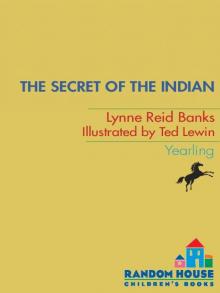 The Secret of the Indian (The Indian in the Cupboard)
The Secret of the Indian (The Indian in the Cupboard)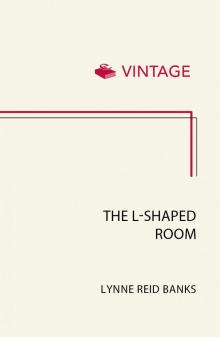 The L-Shaped Room
The L-Shaped Room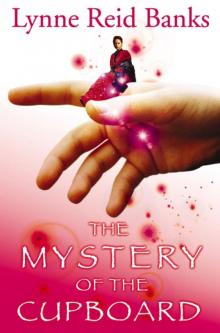 The Mystery of the Cupboard
The Mystery of the Cupboard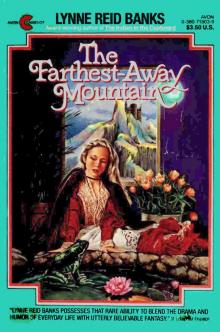 The Farthest-Away Mountain
The Farthest-Away Mountain Harry the Poisonous Centipede Goes to Sea
Harry the Poisonous Centipede Goes to Sea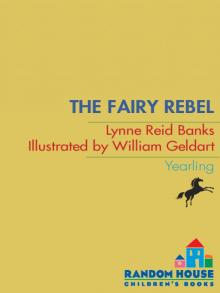 The Fairy Rebel
The Fairy Rebel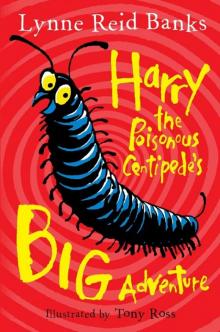 Harry the Poisonous Centipede's Big Adventure: Another Story to Make You Squirm
Harry the Poisonous Centipede's Big Adventure: Another Story to Make You Squirm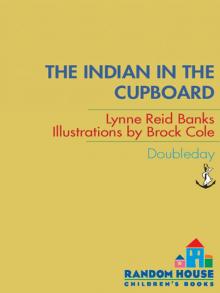 The Indian in the Cupboard
The Indian in the Cupboard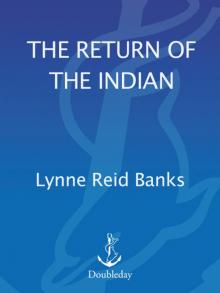 The Return of the Indian
The Return of the Indian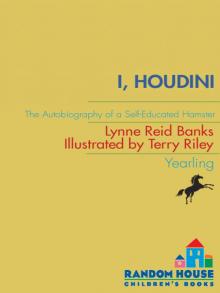 I, Houdini
I, Houdini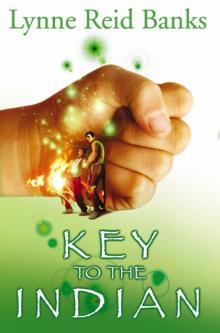 The Key to the Indian
The Key to the Indian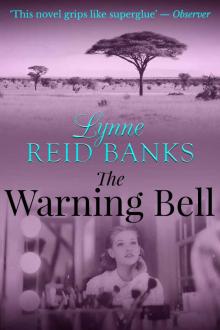 The Warning Bell
The Warning Bell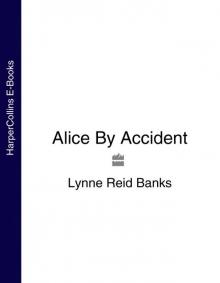 Alice by Accident
Alice by Accident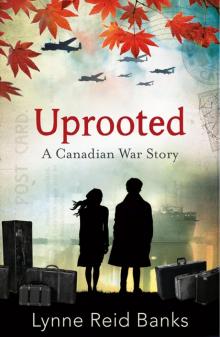 Uprooted
Uprooted Writing On the Wall
Writing On the Wall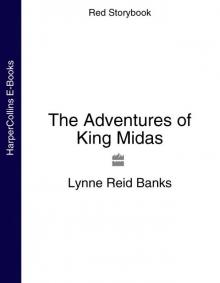 The Adventures of King Midas (Red Storybook)
The Adventures of King Midas (Red Storybook)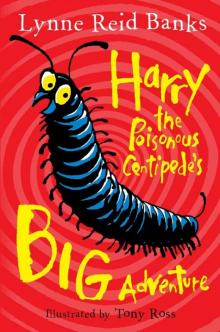 Harry the Poisonous Centipede's Big Adventure
Harry the Poisonous Centipede's Big Adventure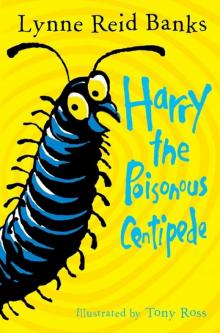 Harry the Poisonous Centipede
Harry the Poisonous Centipede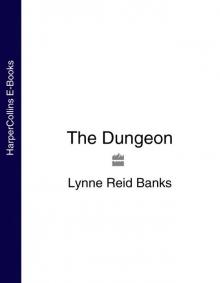 The Dungeon
The Dungeon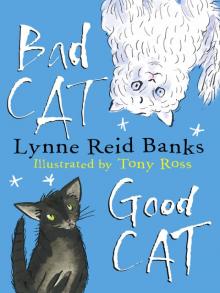 Bad Cat, Good Cat
Bad Cat, Good Cat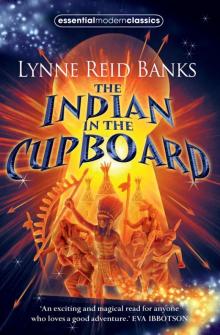 The Indian in the Cupboard (Essential Modern Classics, Book 1)
The Indian in the Cupboard (Essential Modern Classics, Book 1)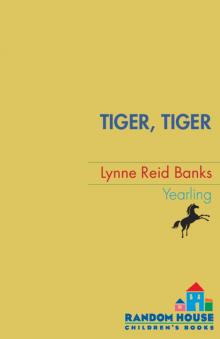 Tiger, Tiger
Tiger, Tiger